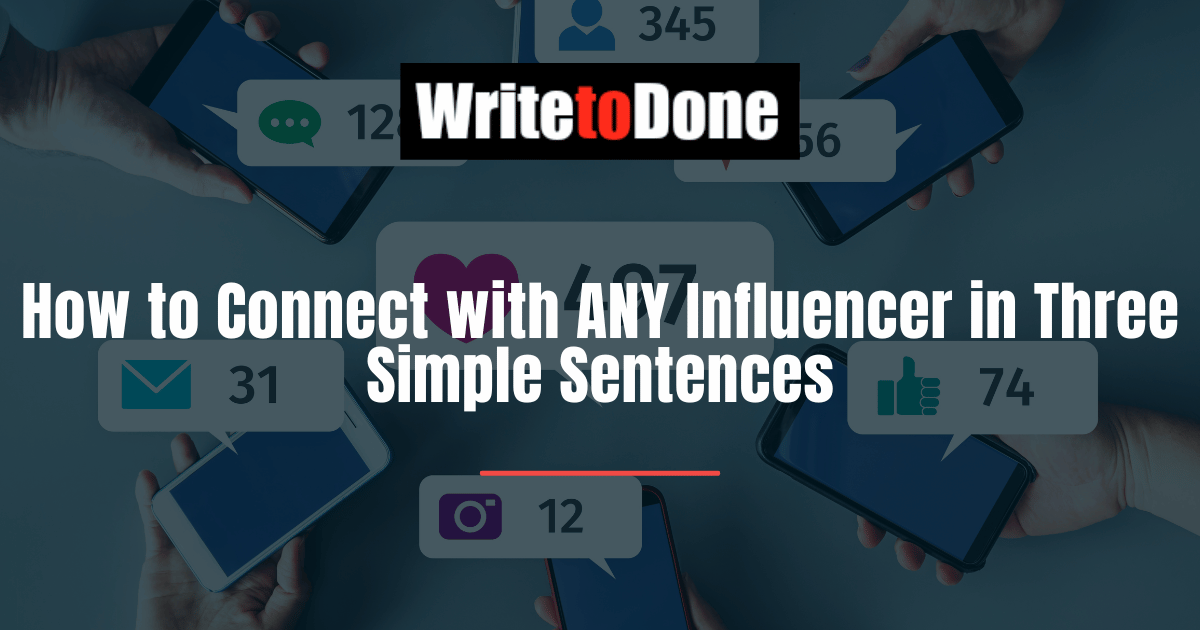Let’s face it, some of the most gifted writers and bloggers are terrible at networking. And it’s hurting their careers.
The most influential people are also busy people. They’re not rude (usually) but simply don’t have time to read your life story in an email.
With brief, strategic communications your emails and notes are more likely to be read—and receive a reply.
As an author coach and agent, I use the three sentence rule to create a too-legit-to-delete message. I use this method myself, and with clients, to establish new business relationships, referrals, and even coveted book endorsements and forewords.
First, let’s discuss salutations.
Dear Delete Me
Seriously. Don’t use the word “dear” to greet someone, unless that person is your grandma.
Instead, use the person’s first name. If you’re feeling sassy, you can add “Hi” or “Hello.” The point is to be yourself, move straight to the first sentence, and avoid alerting the recipient to the fact you’re a frightened rookie.
See also: How to Get to Yes: Writing Highly Effective Query Letters .
The First Sentence: Why
Tell them why you’re interrupting their busy day in one punchy line. This sentence must contain both these elements:
– Why the recipient should care about your email. This might include the fact you share common personal or professional connections. Perhaps you’re from the same home state, or graduated from the same university. Casually mention one or two of those shared interests, but don’t sound like a stalker.
– Proof you’re really familiar with their work, achievements, and worldview
For example: “Love your latest book, especially chapter three, and I’m writing with a related question.” Familiarity with a person’s world shows respect, and lets them know this isn’t a form letter.
The Second Sentence: Who
Show them who you are and what you bring to the conversation.
In other words, answer the question in the recipient’s mind, Who the heck is this person, and should I care? Make it clear you are a peer, not a wanna-be, and bring value to the table.
Of course, we do this in a non-overt way. Instead of saying, “I’m a pretty big deal, and have an amazing 200,000-word novel drafted,” try something like, “My readers sometimes ask me similar questions regarding…”
Notice you didn’t mention your publishing career or how many books you’ve sold, but this line shows you are a writer, have readers, and enjoy interacting with your tribe—even if it’s two people.
The Third Sentence: What
Simply ask what you want to ask. Be clear. Don’t apologize.
If your real goal is an endorsement don’t ask “Would you be willing to take a quick look at my manuscript?” This requires consideration, three more email exchanges, and the possible cancellation of the family vacation. (Delete!)
Instead, propose, “My manuscript is attached, along with a synopsis, a few of the other endorsements I’ve received so far, and some ideas for a short blurb.”
This sentence shows you respect their time, are willing to do some considerate word-smithing, and understand the unwritten rules of connection.
If the goal is advice, don’t just ask “Could I ask a question about writing?” Ask the question.
Also, avoid the trap of a desperate ask, as in, “You’re probably too busy to read this, but…”
Whatever your “ask” is, make it clear—and simple, to say “yes” to.
A Bespoke Subject Line
Now that you’ve articulated a clear why, who, and what, now consider the best subject line for your email. The goals of your subject line are:
– Stay out of SPAM folders
– Be opened, not deleted
– Start the conversation on the right foot
I recommend subject lines which are tailor-made for the recipient. “Quick question about an endorsement” or “Recommendation from our mutual friend Mike Loomis”
Cryptic subject lines like, “Question” or “Connecting” will likely be ignored.
See also: Here’s How You Really Make a Living as a Writer .
Connecting for Book Endorsements
Influencers read between the lines. And they can smell fear. You can be afraid, but your email must be confident.
Here’s the opening sentence from an actual email I sent to a bestselling author on behalf of my client:
“You have a reputation for turning down endorsement requests and I have a reputation for championing remarkable new authors.”
We received a reply and ringing endorsement.
I closed another email, to an eccentric influencer, with “Stay Weird,” as a replacement for a boring, “Sincerely” or the horrid, “Thanks in advance.”
Be nervous, but don’t send a nervous email. Humor, punchy writing, and lack of awkward formality are crucial. Successful people gravitate towards confidence and creativity.
P.S. More Writing Tips
– Don’t use a “P.S.” unless you’re writing sales and marketing copy.
– Avoid frequent “I” contact. If your three-sentence email has the word “I” or “me” in it six times, keep editing.
– Wide open spaces make pleasant reading. Have you ever received an email consisting of one, long, 200-word paragraph? Don’t insult your recipient. Put a blank line between every sentence of your email.
– Do your research and make sure you have the best email address for the influencer and/or their assistant.
– Include your web address in your signature. And make sure your brand is solid before you hit “Send.” As a branding coach for authors, I remind clients that email recipients will click your site before they consider a reply.
Connect with ANY Influencer
Influencers are happy to help others. But too many people try to connect in ways that waste time, and prove they’re not ready for the interaction. You have one chance to make a connection, and this chance lasts about ten seconds.
Obsess over emails to influencers. It’s worth the effort, and you’ll become a better writer in the process. Start small, use the three-sentence strategy, and please tell me how this works for you!
















